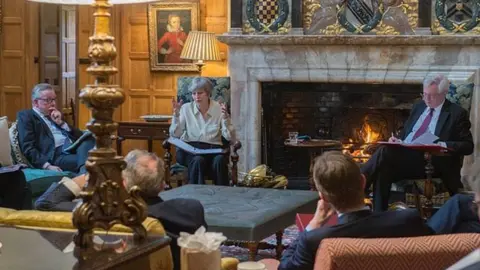Brexit and customs union: A matter of confidence?
 Downing Street
Downing StreetLots of things can be true at the same time, even though they seem to contradict each other. It happens a lot in politics as, if you read my ramblings here often, you'll know I've said before.
This time, lots of seemingly contradicting strands are combining to create a situation that is potentially dangerous for Theresa May, and not very helpful for the UK's case in the Brexit negotiations.
Yes, it is true that a powerful group of Brexiteers believe that they have been told by No 10, that any effort to water down the government's position on the Customs Union would be treated as a vote of confidence, to bring rebel Remainers to heel.
This is in the context not of this week's vote, which would not have any power to force a change of heart, but a vote that will have that authority next month.
It is also true that those potential rebel Remainers believe they have been assured by the government that they would NOT turn a vote on the customs union into a vote of confidence. They think they can try to shift Theresa May's position without collapsing the government, indeed they say the chatter about a confidence vote is a 'ruse' by the Brexiteers.
Downing Street says publicly that no such decision has been made. It's not surprising that in uncharted territory they don't want to be bound to one position now over a vote that's not for another month.
But it is also true that No 10 cannot sustain a situation where the two opposing sides in the Tory party who are in perma-campaign mode, are continually told the opposite. It is not possible to drive left and right at the same time.
It is also true that the government's public position has been clear for ages - to leave the customs union and pursue two separate potential models, the 'hybrid' and the 'max fac' . If you want to read more details about how they could both work read here.
But it is also true that some Cabinet ministers believe that only the second option is remotely viable. Even in No 10 senior figures accept that they are nowhere near being able to prove to the EU that the hybrid model would work.
Even the Brexit Secretary himself, David Davis, questioned its credibility almost as soon as it was published, saying it was "blue sky thinking". Many months on, at least in public, there doesn't seem to be much evidence that would change his or other Brexiteer ministers' views.
That's why there are whispers, as on the front of today's Times, that he and others might try to force the PM to ditch it.
It's also the case that there has not been enough progress towards sorting out the Irish border question. Whether the UK should call the EU's bluff as some Brexiteers suggest, or accept what others see as inevitable and change position, is a different question. For as long as the question is open, the border question is a proxy for the whole debate about the world after Brexit.
Should we mirror the existing arrangements we have to minimise disruption, or go for a more radical break?
The most important truth is that with a divided party and no majority, it's massively difficult for Theresa May to settle that question.
Her survival so far has hinged on only inching forward, but pressure is building through the proxy of the arguments about the customs union, to take a bolder next step.
